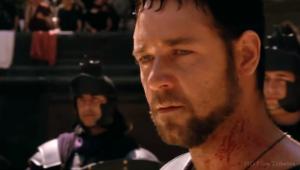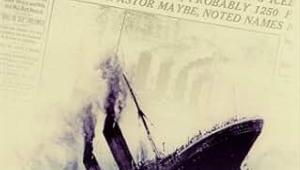Sussing Out the Churchills & 2 Hidden Sci-Fi Treasures

But enough of that. The first two of my Hidden Treasures are serious films about Winston Churchill, and the other two are light science fiction.
The Gathering Storm ( 2003) and Into the Storm (2009)
Both of these films, made for television by HBO Films, were never released on Blu-ray but are available streamed from Amazon Prime in better video quality than you'll find on their (adequate) DVD versions. Both also offer the benefit of commentary tracks if you view them on disc. Neither is of demo quality in any form, but both are highly relevant given the current interest in the subject, driven by the recent theatrical films Dunkirk and Darkest Hour. The latter pair are also highly recommended and are now available on Blu-ray in reference quality video and sound. Dunkirk is available on Ultra HD Blu-ray as well.
The two films here go into more depth than those current releases about the period from the mid 1930's when Britain was woefully unprepared for what was to come, to Churchill's experiences in and after the war. The coverage of the post-war period, told here in intermittent flash-forwards, is the least interesting part of Into the Storm and drags the latter down a bit, though it does offer some interesting details about why Churchill lost an election almost immediately after the war.
Many actors have played Churchill over the years, with varying degrees of success. In The Gathering Storm Albert Finney shines in the part. Brendan Gleeson is just as effective in Into the Storm, though the transition may be a bit jarring if you watch the two films back to back. Vanessa Redgrave plays Clementine with Finney, Janet McTeer with Gleeson.
If history doesn't interest you, you'll likely be bored by all of this. If it does, you'll find these two films irresistible.
The Last Starfighter
 On an extended flight layover in New York City in 1984 I decided to take in a movie. It was The Last Starfighter. I knew little about it, other than it was sci-fi and made extensive use of a new-fangled technique called computer graphics for its special effects. Waiting in the lobby for the previous showing to end, I could hear the music from the end credits. I knew immediately that I'd like the film, and luckily I was right.
On an extended flight layover in New York City in 1984 I decided to take in a movie. It was The Last Starfighter. I knew little about it, other than it was sci-fi and made extensive use of a new-fangled technique called computer graphics for its special effects. Waiting in the lobby for the previous showing to end, I could hear the music from the end credits. I knew immediately that I'd like the film, and luckily I was right.
In many ways this was B-picture sci-fi even in its day, with the first two Star Wars films, Raiders of the Lost Ark, E.T., a pair of Star Trek movies, Alien, and Blade Runner, among others, already in the rear view mirror. Today it certainly comes across as a little old-fashioned and outdated. Alex, a teenage computer game whiz (back when all computer games were in big, coin-operated vending machines and about as sophisticated as Pac-Man) gets whisked away to another planet where he's caught up in an interstellar war. Aliens, it appears, have placed these game machines all over the planet to find candidates with the skills needed to be an ace warrior in their battle with the baddies. As he's whisked away to war, his place at home is temporarily taken by an android duplicate.
It's all done with a light touch, with the action in space alternating with events on Earth. There's nothing here that a six-year-old can't handle. The story is helped immensely by Robert Preston, in his last role, playing the alien who recruits Alex and milking his Music Man shtick for all it's worth. The film is warm-hearted, with an ending that's vaguely reminiscent of E.T., and Craig Safan's music score (his best film work), is strong and often moving.
The scene that most sticks in my mind shows Alex, early in the film, sitting in his room in his mother's dumpy trailer park. As he hears the boring chatter of men outside, he looks at a model of the solar system hanging from the ceiling and obviously wishes he were somewhere else. Anywhere else. He got a lot more than that.
But if it weren't for the historical significance of its effects, The Last Starfighter might well have slipped down the memory hole by now. It isn't that the effects are amazing; they're anything but. They are, however, interesting in that they show us just how far we've come, for better or worse, in using CGI to up the ante in special effects. It's been, you'll excuse the expression, Transformative. What you see here looks very much like the rough first cut of today's CGI, awaiting refinement into something that looks photo-realistic but needing computer power to do so, power that simply didn't exist (or would have been brutally expensive) back in 1984.
The Last Starfighter's Blu-ray release is marginal HD at best, particularly when blown up onto a big screen. But in small, winning ways the film offers a unique historical look of what was to come.
Inner Space
 From outer space we slip to Inner Space reminiscent, though only in a general way, to the movie Fantastic Voyage from the mid '60s. Tuck Pendleton (Dennis Quaid), a failed astronaut, signs up for an experiment in which he'll be sealed into a pod, shrunk to near microscopic proportions, and then injected into the bloodstream of a rabbit. But things go wildly wrong and he's injected instead into Jack, a mild-mannered, hypochondriac grocery store clerk (Martin Short). Things go from bad to worse as a terrorist group is working to steal the shrink technology.
From outer space we slip to Inner Space reminiscent, though only in a general way, to the movie Fantastic Voyage from the mid '60s. Tuck Pendleton (Dennis Quaid), a failed astronaut, signs up for an experiment in which he'll be sealed into a pod, shrunk to near microscopic proportions, and then injected into the bloodstream of a rabbit. But things go wildly wrong and he's injected instead into Jack, a mild-mannered, hypochondriac grocery store clerk (Martin Short). Things go from bad to worse as a terrorist group is working to steal the shrink technology.
The Blu-ray's HD quality is marginally better than The Last Starfighter's, but it won't be on anyone's list of reference discs. Nevertheless, the film is more funny than scary, and apart from a little salty language (mostly courtesy of Tuck) it's suitable for practically everyone. Veteran audiophiles should also watch closely for a certain famous preamp on the piano in Tuck's well-littered apartment, as a drunken Jack spastically dances around the room.
Viewers will also appreciate the surprising opening credits, the hilarious performance by Martin Short and the way he grows from a hopeless schlemiel into a hero as the film progresses, the irresistible Meg Ryan, an ending clearly aimed at a sequel that never came, a fine score by Jerry Goldsmith, and the impressive, Oscar-winning special effects from the legendary Dennis Muren—effects that, unlike The Last Starfighter's still hold up today.
- Log in or register to post comments






























































